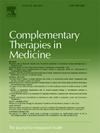Effect of long-term exercise-based interventions on thyroid function in hypothyroidism: A systematic review and meta-analysis of randomized controlled trials
IF 3.5
3区 医学
Q1 INTEGRATIVE & COMPLEMENTARY MEDICINE
引用次数: 0
Abstract
Objective
This study aimed to assess the effects of exercise interventions of more than 8 weeks on thyroid function in adults with hypothyroidism through a systematic review and meta-analysis of randomized controlled trials.
Materials and methods
The PEDro, WOS, PubMed, Cochrane Central Register of Controlled Trials, and Scopus databases were searched for relevant articles, which then underwent standardised screening, data extraction, and bias risk assessment. A total of seven randomised controlled trials (n = 7) were included, predominantly examining 12 weeks of exercise therapy. A meta-analysis was conducted using data extracted from the included studies. Standardised mean differences were calculated for thyroid-stimulating hormone levels, and heterogeneity was assessed using the I2 statistic. The certainty of evidence was evaluated using the GRADE approach.
Results
Statistically significant reductions in thyroid stimulating hormone (TSH) levels (SMD: −3.254; 95 % CI: −3.937 to −2.572; p < 0.001) and increases in thyroxine (T4) level (SMD: 1.315; 95 % CI: 0.263–2.367; p = 0.015) were noted in exercise intervention groups as compared to control groups. Heterogeneity was moderate (I² = 65.93 %, p = 0.019) and no publication bias was detected. In addition, based on GRADE assessment, the certainty of evidence was rated as moderate for the TSH outcome and very low for the T4 outcome.
Conclusion
Findings from seven randomised controlled trials support the integration of long-term exercise as a non-pharmacological adjunct in the management of hypothyroidism. Exercise interventions, alongside conventional treatment, appear to improve thyroid function by reducing TSH and increasing T4 levels.
长期运动干预对甲状腺功能减退患者甲状腺功能的影响:随机对照试验的系统回顾和荟萃分析
本研究旨在通过随机对照试验的系统回顾和荟萃分析,评估超过8周的运动干预对甲状腺功能减退症成人患者甲状腺功能的影响。材料和方法在PEDro、WOS、PubMed、Cochrane Central Register of Controlled Trials和Scopus数据库中检索相关文章,然后进行标准化筛选、数据提取和偏倚风险评估。共纳入7项随机对照试验(n = 7),主要检查12周的运动治疗。使用从纳入研究中提取的数据进行荟萃分析。计算促甲状腺激素水平的标准化平均差异,并使用I2统计量评估异质性。使用GRADE方法评估证据的确定性。结果:有统计学意义的促甲状腺激素(TSH)水平降低(SMD:−3.254;95 % CI:−3.937 ~−2.572;p <; 0.001)和甲状腺素(T4)水平升高(SMD: 1.315;95 % ci: 0.263-2.367;P = 0.015)。异质性为中等(I²= 65.93 %,p = 0.019),未发现发表偏倚。此外,基于GRADE评估,TSH结果的证据确定性被评为中等,T4结果的证据确定性被评为非常低。结论:7项随机对照试验的结果支持长期运动作为治疗甲状腺功能减退的非药物辅助手段。运动干预与传统治疗一起,似乎通过降低TSH和增加T4水平来改善甲状腺功能。
本文章由计算机程序翻译,如有差异,请以英文原文为准。
求助全文
约1分钟内获得全文
求助全文
来源期刊

Complementary therapies in medicine
医学-全科医学与补充医学
CiteScore
8.60
自引率
2.80%
发文量
101
审稿时长
112 days
期刊介绍:
Complementary Therapies in Medicine is an international, peer-reviewed journal that has considerable appeal to anyone who seeks objective and critical information on complementary therapies or who wishes to deepen their understanding of these approaches. It will be of particular interest to healthcare practitioners including family practitioners, complementary therapists, nurses, and physiotherapists; to academics including social scientists and CAM researchers; to healthcare managers; and to patients. Complementary Therapies in Medicine aims to publish valid, relevant and rigorous research and serious discussion articles with the main purpose of improving healthcare.
 求助内容:
求助内容: 应助结果提醒方式:
应助结果提醒方式:


